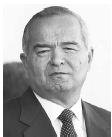UZBEKISTAN
Islam Karimov
President

(pronounced "iz-LAHM ka-REE-moff")
"A firm hand is needed in today's explosive situation, and the people of Uzbekistan will not accept Western-style democracy because of their history and national character."
The Republic of Uzbekistan is by far the most populous of the predominantly Muslim Central Asian republics of the former Soviet Union. This landlocked nation shares borders with the other former Soviet republics of Turkmenistan, Kyrgyzstan, Tajikistan, and Kazakhstan, as well as with Afghanistan. It has a land area of 447,400 sq km (172,741 sq mi).
The rapidly growing population was estimated at 25.5 million in 2002. A Soviet-era census listed about 80% of the population as ethnic Uzbeks, 5% Russian (most of whom live in the capital of Tashkent), and the rest mainly other Central Asian peoples. By various estimates, between one-third and one-half of Uzbekistan's 1.65 million Russians have left. Despite decades of Soviet anti-religious propaganda, centers of Islamic study and religiosity continued to operate. Most Uzbeks belong to the Sunni branch of Islam. The population is predominantly rural (60%) and agrarian.
Nearly 75% of the arable land is dedicated to cotton, a legacy of Soviet central planning. Irrigating the arid land for cotton has led to the draining of the Aral Sea, formerly the fourth-largest inland body of water in the world, of 65% of its volume. The sea's depletion and the resultant salinization of tens of thousands of square kilometers of land, together with extreme overuse of pesticides, have led to one of the world's worst ecological and public-health catastrophes. The economy is mostly based on agriculture and energy and mineral extraction. It is currently the world's fourth largest producer of cotton, the seventh-largest producer of gold, and among the top ten in natural gas production. According to the U.S. Department of Energy, Uzbekistan has over one billion barrels of proven and possible oil reserves and 109– 123 trillion cubic feet of gas reserves.
President Karimov aims to move gradually toward "market socialism" in order to ensure social stability. Uzbekistan put restrictive trade practices into effect after 1997, including high import tariffs that were imposed on Kazakhstan and Kyrgyzstan in 1999. The currency is the som; a restrictive currency conversion system holds back exports. The economy began to recover somewhat in 1996. Consumer price inflation decreased to about 30% in 2002 (compared to 204% in 1995). Gross domestic product (GDP) was US $62 billion and per capita GDP was approximately US $2,500 in 2001. A bad cotton harvest in 1998 and declines in world commodity prices contributed to a decline in exports, leading the government to increase foreign short-term debts and draw down international reserves. The Uzbek government reported that industrial and agricultural production increases contributed to a 4.4% rise in GDP during the first nine months of 1999; growth slowed to about 2% in 2000, and it was expected to be about 4% in 2003. Widespread poverty, unemployment (10%), and underemployment (20%) provide grounds for religious extremism and dissent to grow, according to many observers. Most state-owned apartments and many small enterprises have been privatized.
Comment about this article, ask questions, or add new information about this topic: